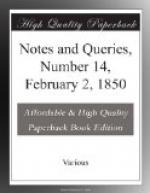To say that a man’s merits and frailties repose in trembling hope before God, is surely not irreverent; and this is, I think, all that Gray intended to convey in the words to which your correspondent objects.
W.L.M.
[The latter emendation “would he rove,” which is neither in the Aldine edition of the Rev. J. Mitford, nor in Mr. Van Voorst’s beautifully illustrated Polyglot edition, should clearly be introduced, in future, as harmonising more perfectly with the “would he stretch” of the preceding stanza.]
Gray’s Elegy.—To the list of German translations of Gray’s Elegy should be added the version by Kosegarten, which is said by Mr. Thimm, in his View of German Literature, to be “very spirited.” The edition of Kosegarten i have now before me was printed at Greifswald, in 12 vols. in 1824, and contains numerous translations from English poets.
J.M.
Oxford, Jan. 16.
Gregori’s Italian Version of “Gray’s Elegy."—In answer to the query of “J.F.M.,” respecting the translations of Gray’s Elegy, I beg to mention that, besides those already possessed by your correspondent, and those in Torri’s polyglot edition, there is one in Italian by Domenico Gregori, published in the first volume of his Scelta di Poesie di piu celebri Autori Inglesi, recati in Versi Italiani, and printed at Rome in 1821, in 2 vols. small 8vo.
M.
Oxford, Jan. 17. 1850.
Name of Shylock.—When Mr. Knight says that Scialac was “the name of a Marionite (Maronite?) of mount Libanus,” he appears to consider the {222} term peculiar, or nearly so, to that personage; but Upton, as long ago as 1748, in his Critical Observations, 2nd ed. p. 299., remarked, that Scialac was the generic name, and Shylock merely a corruption. I may also remark, that Mr. Knight dismisses Dr. Farmer’s theory as worthless, without sufficient consideration. It by no means follows that 1607 is the date of the first edition of Caleb Shillocke, merely because Boswell saw a copy bearing that date.
J.O. HALLIWELL.
* * * * *
SONNET.
Written on the close of the Session, 1849.
“The tyme cam that resoun was to ryse.”—CHAUCER.
“Corin. And how like you this shepherd’s life, Master Touchstone?
“Touchstone. Truly, shepherd, in respect of itself it is a good life.... In respect it is in the Fields, it pleaseth me well.”—SHAKSPEARE.
Ho! for the shady grove and silvery stream!
Now that yclosed is the Fane,
where I
Am doomed, by no unhappy destiny,
To tend those Mighty Ones who find a theme
For their lives’ labour
in the nation’s weal.
Now am I free, or book or rod in hand,
Alone, or compassed by a cherub band
Of laughing children, by the




